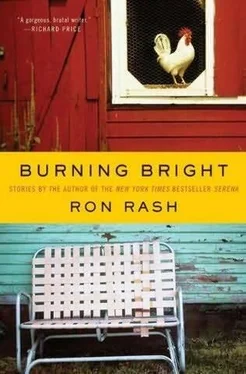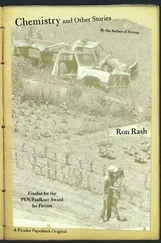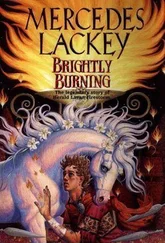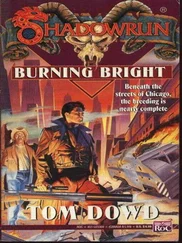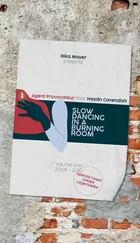Jacob gazed past Hartley’s dog, across the road to the acre of corn where he’d work till suppertime. He hadn’t hoed a single row yet but already felt tired all the way to his bones.
“I didn’t want that dog killed,” Edna said. “That wasn’t my intending.”
“Like it wasn’t your intending for Joel and Mary to leave and never darken our door again,” Jacob replied. “But it happened, didn’t it.”
He turned and walked to the woodshed to get his hoe.
The next morning the dog was gone from the roadside and more eggs were missing. It was Saturday, so Jacob rode the horse down to Boone, not just to get his newspaper but to talk to the older farmers who gathered at Mast’s General Store. As he rode he remembered the morning six years ago when Joel dropped his bowl of oatmeal on the floor. Careless, but twelve-year-olds did careless things. It was part of being a child. Edna made the boy eat the oatmeal off the floor with his spoon. “Don’t do it,” Mary had told her younger brother, but he had, whimpering the whole time. Mary, who was sixteen, eloped two weeks later. “I’ll never come back, not even to visit,” a note left on the kitchen table said. Mary had been true to her word.
As Jacob rode into Boone, he saw the truck the savings and loan had repossessed from him parked by the courthouse. It was a vehicle made for hauling crops to town, bringing back salt blocks and fertilizer and barbed wire, but he’d figured no farmer could have afforded to buy it at auction. Maybe a store owner or county employee, he supposed, someone who still used a billfold instead of a change purse like the one he now took a nickel from after tying his horse to the hitching post. Jacob entered the store. He nodded at the older men, then laid his coin on the counter. Erwin Mast handed him last Sunday’s Raleigh News .
“Don’t reckon there’s any letters?” Jacob asked.
“No, nothing this week,” Erwin said, though he could have added, “or the last month or last year.” Joel was in the navy, stationed somewhere in the Pacific. Mary lived with her husband and her own child on a farm in Haywood County, sixty miles away but it could have been California for all the contact Jacob and Edna had with her.
Jacob lingered by the counter. When the old men paused in their conversation, he told them about the eggs.
“And you’re sure it ain’t a dog?” Sterling Watts asked.
“Yes. There wasn’t a bit of splatter or shell on the straw.”
“Rats will eat a egg,” Erwin offered from behind the counter.
“There’d still be something left, though,” Bascombe Lindsey said.
“They’s but one thing it can be,” Sterling Watts said with finality.
“What’s that,” Jacob asked.
“A big yaller rat snake. They’ll swallow two or three eggs whole and leave not a dribble of egg.”
“I’ve heard such myself,” Bascombe agreed. “Never seen it but heard of it.”
“Well, one got in my henhouse,” Sterling said. “And it took me near a month to figure out how to catch the damn thing.”
“How did you?” Jacob asked.
“Went fishing,” Sterling said.
That night Jacob hoed in his cornfield till dark. He ate his supper, then went to the woodshed and found a fishhook. He tied three yards of line to it and went to the henhouse. The bantam had one egg under her. Jacob took the egg and made as small a hole as possible with the barb. He slowly worked the whole hook into the egg, then tied the line to a nail head behind the nesting box. Three yards, Watson had said. That way the snake would swallow the whole egg before a tight line set the hook.
“I ain’t about to go out there come morning and deal with no snake,” Edna said when he told her what he’d done. She sat in the ladderback rocking chair, her legs draped by a quilt. He’d made the chair for her to sit in when she’d been pregnant with Joel. The wood was cherry, not the most practical for furniture, but he’d wanted it to be pretty.
“I’ll deal with it,” Jacob said.
For a few moments he watched her sew, the fine blue thread repairing the binding of the Bear’s Claw quilt. Edna had worked since dawn, but she couldn’t stop even now. Jacob sat down at the kitchen table and spread out the newspaper. On the front page Roosevelt said things were getting better, but the rest of the news argued otherwise. Strikers had been shot at a cotton mill. Men whose crime was hiding in boxcars to search for work had been beaten with clubs by lawmen and hired railroad goons.
“What you claimed this morning about me running off Joel and Mary,” Edna said, her needle not pausing as she spoke, “that was a spiteful thing to say. Those kids never went hungry a day in their lives. Their clothes was patched and they had shoes and coats.”
He knew he should let it go, but the image of Hartley’s knife opening the hound’s throat had snared in his mind.
“You could have been easier on them.”
“The world’s a hard place,” Edna replied. “There was need for them to know that.”
“They’d have learned soon enough on their own,” Jacob said.
“They needed to be prepared, and I prepared them. They ain’t in a hobo camp or barefoot like Hartley and his clan. If they can’t be grateful for that, there’s nothing I can do about it now.”
“There’s going to be better times,” Jacob said. “This depression can’t last forever, but the way you treated them will.”
“It’s lasted nine years,” Edna said. “And I see no sign of it letting up. The price we’re getting for corn and cabbage is the same. We’re still living on half of what we did before.”
She turned back to the quilt’s worn binding and no other words were spoken between them. After a while Edna put down her sewing and went to bed. Jacob soon followed. Edna tensed as he settled his body beside hers.
“I don’t want us to argue,” Jacob said, and laid his hand on her shoulder. She flinched from his touch, moved farther away.
“You think I’ve got no feelings,” Edna said, her face turned so she spoke at the wall. “Stingy and mean-hearted. But maybe if I hadn’t been we’d not have anything left.”
Despite his weariness, Jacob had trouble going to sleep. When he finally did, he dreamed of men hanging onto boxcars while other men beat them with sticks. Those beaten wore muddy brogans and overalls, and he knew they weren’t laid-off mill workers or coal miners but farmers like himself.
Jacob woke in the dark. The window was open and before he could fall back asleep he heard something from inside the henhouse. He pulled on his overalls and boots, then went out on the porch and lit a lantern. The sky was thick with stars and a wet moon lightened the ground, but the windowless henhouse was pitch dark. It had crossed his mind that if a yellow rat snake could eat an egg a copperhead or satinback could as well, and he wanted to see where he stepped. He went to the woodshed and got a hoe for the killing.
Jacob crossed the foot log and stepped up to the entrance. He held the lantern out and checked the nesting box. The bantam was in it, but no eggs lay under her. It took him a few moments to find the fishing line, leading toward the back corner like a single strand of a spider’s web. He readied the hoe in his hand and took a step inside. He held the lamp before him and saw Hartley’s daughter huddled in the corner, the line disappearing into her closed mouth.
She did not try to speak as he kneeled before her. Jacob set the hoe and lantern down and took out his pocketknife, then cut the line inches above where it disappeared between her lips. For a few moments he did nothing else.
“Let me see,” he said, and though she did not open her mouth she did not resist as his fingers did so. He found the hook’s barb sunk deep in her cheek and was relieved. He’d feared it would be in her tongue or, much worse, deep in her throat.
Читать дальше
